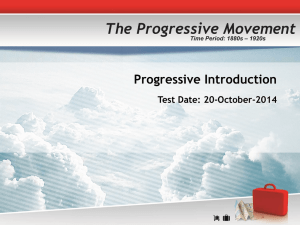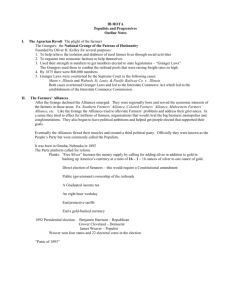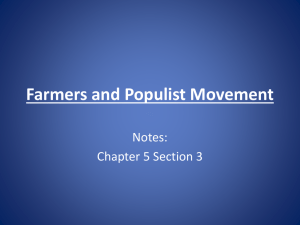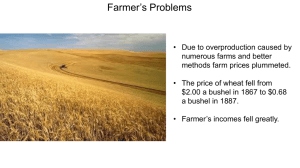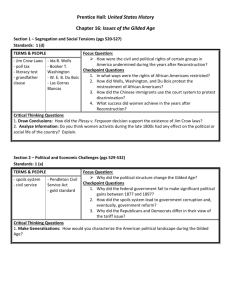Chapter 12 study guide
advertisement
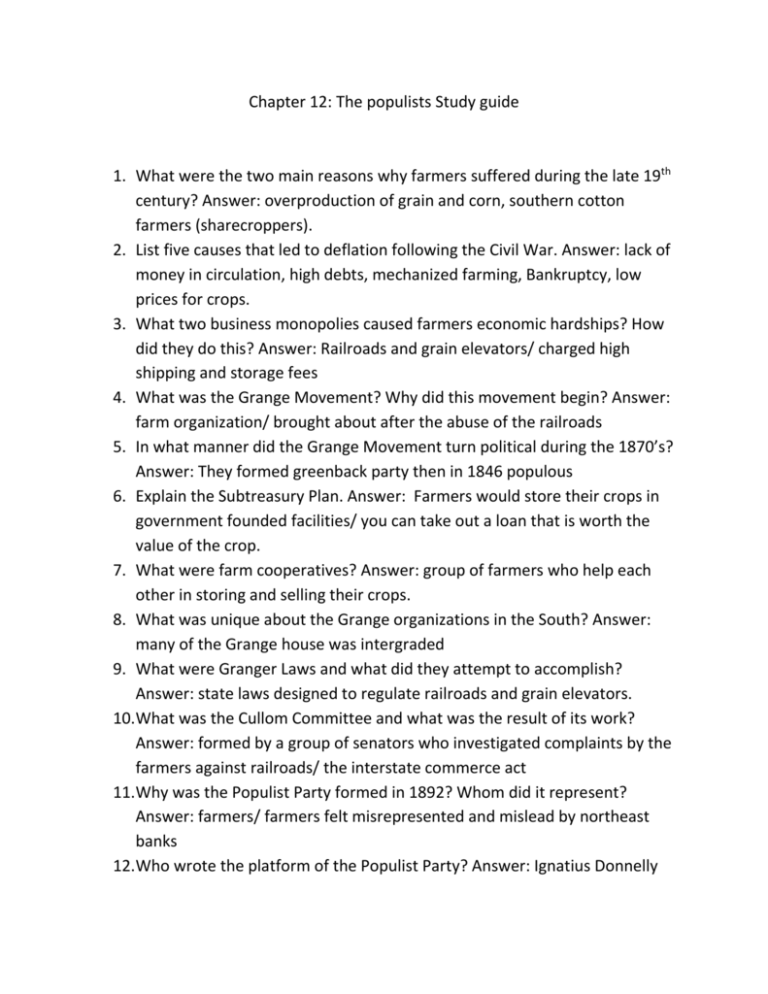
Chapter 12: The populists Study guide 1. What were the two main reasons why farmers suffered during the late 19th century? Answer: overproduction of grain and corn, southern cotton farmers (sharecroppers). 2. List five causes that led to deflation following the Civil War. Answer: lack of money in circulation, high debts, mechanized farming, Bankruptcy, low prices for crops. 3. What two business monopolies caused farmers economic hardships? How did they do this? Answer: Railroads and grain elevators/ charged high shipping and storage fees 4. What was the Grange Movement? Why did this movement begin? Answer: farm organization/ brought about after the abuse of the railroads 5. In what manner did the Grange Movement turn political during the 1870’s? Answer: They formed greenback party then in 1846 populous 6. Explain the Subtreasury Plan. Answer: Farmers would store their crops in government founded facilities/ you can take out a loan that is worth the value of the crop. 7. What were farm cooperatives? Answer: group of farmers who help each other in storing and selling their crops. 8. What was unique about the Grange organizations in the South? Answer: many of the Grange house was intergraded 9. What were Granger Laws and what did they attempt to accomplish? Answer: state laws designed to regulate railroads and grain elevators. 10.What was the Cullom Committee and what was the result of its work? Answer: formed by a group of senators who investigated complaints by the farmers against railroads/ the interstate commerce act 11.Why was the Populist Party formed in 1892? Whom did it represent? Answer: farmers/ farmers felt misrepresented and mislead by northeast banks 12.Who wrote the platform of the Populist Party? Answer: Ignatius Donnelly 13.List five platforms in the Populist Party’s campaign of 1892. Answer: wanted the direct election of senators/ wanted the government to control railroads, telephone, and telegraph companies/ The adoption of the subtreasury plan/ unlimited coinage of silver at the ratio of 16:1/ wanted a graduated income tax 14. What crisis did the Democratic Party face in 1896? Answer: the democratic party was split into two parties. 15.Whom did the Populists nominate as their presidential candidate in 1892? Why did they choose this person? Answer: William J. Bryan/ he was nominated by the democrats 16.What happens to the Populist Party following the Election of 1896? Answer: it disappears 17.What were the three legacies of the Populist Movement? Answer: the 16th amendment, the 17th amendment, Hepburn Act 18.What was the state of American farmers following the Election of 1896? Answer: declined in importance/ over production, increase in share croppers 19. Which two constitutional amendments are were directly attributed to the Populist Movement? Answer: 16th and 17th amendments 20.Why do third parties in America usually fail? Answer: usually deals are stolen by democrats or republicans IDs 1. 2. 3. 4. 5. William McKinley-Republican presidential nominee William J. Bryan-Democratic and populist nominee Charles McCuen-wrote the subtreasury plan Patrons of Husbandry-another name for the Grange Movement Hepburn Act (1906)-increased the power of the ICC. Made decisions of the ICC final 6. Greenback Party-formed by the farmers 7. Ignatius Donnelly-was one of the founding fathers of the populist party. He wrote the party’s platform. 8. Omaha Platform-platform written by Ignatius Donnelly 9. James B. Weaver-was nominated by the populist party 10.16th and 17th amendment-gave the U.S. the right to collect an income tax/ direct election of senators Discussion 1. Discuss the three Granger Cases: Munn v Illinois (1877); Peik v the Chicago and Northwestern Railway (1877); and the Wabash Case (1886). What did the railroads and grain elevators argue in the opposition to the Granger Laws in each case? What was the end result of these cases in 1886? Answer: grail elevators filed suit against Granger laws. Supreme Court sided with the Granger laws. Rail road’s against Granger laws saying Granger laws were unconstitutional. Granger laws by limiting their profits they are violating the interstate commerce act. Court votes in favor of the farmers. Railroads file case. Railroads win. Peik revised . Court says only congress can enforce the interstate commerce act. So granger laws unconstitutional.
